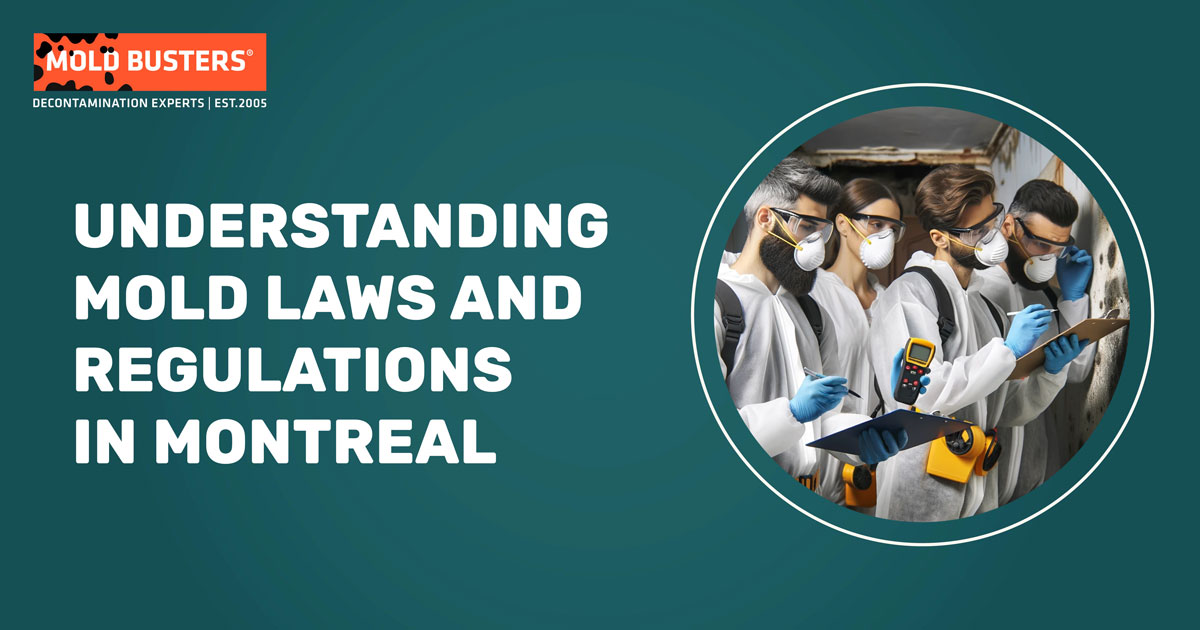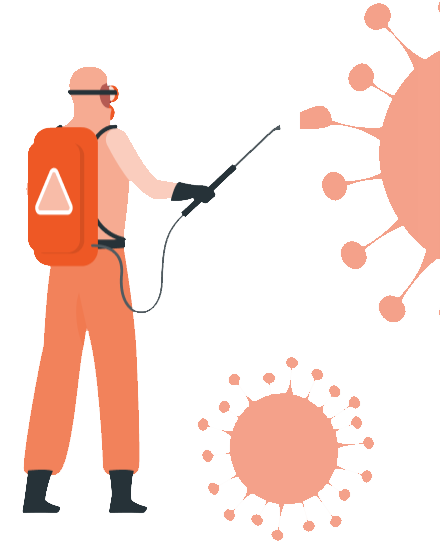Understanding Mold Laws and Regulations in Montreal
Mold is not just unsightly—it’s unhealthy, and in the cosmopolitan city of Montreal, regulations have been set to control its menacing presence.
This guide dives into the labyrinthine of mold-related laws in Montreal, exploring ways to stay compliant while ensuring safety at home or business premises.
An understanding of these vital guidelines equates to a healthier environment for all. Ignorance is no longer an excuse; it’s time to wipe out mold’s grip on our spaces! Let’s decode Montreal’s mold regulations together.
🔎 Request a Consultation
7 Key Facts About Mold Laws and Regulations in Montreal
Montreal, a city known for its vibrant culture and historical architecture, also has stringent regulations to ensure the maintenance and sanitation of properties. For property owners, understanding these laws is crucial for maintaining a safe and healthy environment. This guide delves into seven critical aspects of mold laws and regulations in Montreal, providing property owners with essential knowledge to navigate these requirements effectively.

1. Responsibility for Property Maintenance
In Montreal, property owners have a significant responsibility to keep their properties in good condition. This encompasses various aspects, from mowing lawns to avoiding the accumulation of harmful materials. The city mandates that lawns must be mowed regularly, with grass height not exceeding certain limits. Moreover, property owners must ensure that no hazardous or unclean materials are stored, thrown away, or buried on their property. These measures are vital for maintaining public health and safety.
2. Private Property Standards
The standards for private and vacant properties are quite specific. Lawns must be kept under a maximum height, and there is a prohibition against letting noxious weeds grow. The rules also extend to the type of materials that cannot be stored on the property, including garbage, debris, scrap metal, and vehicle carcasses. These regulations ensure that private lots contribute positively to the city’s overall cleanliness and aesthetic appeal.
3. Sanitation Standards for Dwellings
Sanitation standards in Montreal cover a broad range of elements essential for a habitable living space. These include maintenance, dimensions, lighting, ventilation, and the presence of mold. The city aims to combat issues like uncleanliness, deterioration of properties, and the presence of vermin or visible mold. Property owners are responsible for ensuring that these standards are met to maintain a healthy living environment.
4. Building Maintenance Requirements
The structural integrity of buildings is also under scrutiny. All parts of a building must be maintained in good condition, with adequate load-bearing capacity. This includes timely repairs or replacements as required. Such regulations are in place to ensure the safety and longevity of buildings in Montreal.
5. Safety Considerations in Dwellings
Safety in dwellings extends beyond mere structural integrity. Factors such as means of evacuation, fire protection, and smoke detectors are crucial. These requirements are part of a broader effort to ensure that all residential buildings in Montreal provide a safe living environment for their occupants.
6. Mold Prevention and Remediation
Mold prevention is a key aspect of property maintenance. Property owners need to be vigilant about high humidity levels, as they can lead to mold growth. Effective ventilation, quick action in case of water damage, and proper cleaning of affected surfaces are essential steps in preventing and addressing mold issues. The guidance provided helps property owners understand how to maintain a healthy environment and what to do if mold becomes an issue.
7. Legal Recourse and Support
In instances where property owners or tenants face issues regarding compliance with these regulations, there are legal avenues available. The Tribunal administratif du logement provides information on rights and obligations and helps in resolving disputes. Additionally, the city offers financial assistance programs for property owners undertaking costly renovation work to comply with these standards.
Adhering to these seven key aspects of mold laws and regulations in Montreal is crucial for property owners. Not only do these laws ensure the safety and well-being of occupants, but they also contribute to the overall health and aesthetic of the city. Property owners should remain informed and proactive in maintaining their properties to avoid legal complications and ensure a safe living environment.
10% OFF
Schedule services online and save!
Available for home owners, landlords, businesses & property managers. If you are a tenant, please call to schedule your appointment.
YOUR PROMO CODE
MARCH10
Valid until March 31st, 2023
Guide on Mold Laws and Regulations in Montreal
Montreal, with its unique blend of history and modernity, is not just about architectural beauty but also about maintaining healthy living environments. This comprehensive guide is crafted to provide property owners in Montreal with detailed insights and action points concerning mold issues, aligning with local laws and regulations.
1. Understanding Mold and Its Impacts
Mold, a type of fungus, thrives in damp and poorly ventilated areas and can cause health issues. It’s essential to recognize that mold spores are invisible and can enter homes through air currents, humans, or pets. Significant mold growth, especially in habitable spaces, can lead to health problems, making its prevention and elimination a priority.
2. Identifying Mold in Your Property
Spotting mold involves looking for certain signs, such as colored spots (often green or black) on walls, ceilings, or carpets, an earthy smell, or evidence of water seepage. Regular inspections can help in early detection. For instance, inspecting your property’s exterior, including the roof, siding, attic, and drains, helps in finding potential causes of water infiltration and mold.
3. Acting Swiftly in Case of Water Damage
Water damage, if not addressed promptly, can lead to mold growth. It is advised to clean and dry all water damage within 24 to 48 hours. Porous materials heavily damaged by water, like drywall, carpets, and upholstered furniture, should be discarded to prevent mold development.
4. Preventing High Indoor Humidity
High humidity levels are a breeding ground for mold. To prevent this:
- Limit long showers and use exhaust fans during bathing or cooking.
- Ensure proper connection of the dryer hose to an external output.
- Use dehumidifiers appropriately, particularly in basements, and maintain them regularly.
- Keep indoor humidity levels between 30% and 55%, using hygrometers for monitoring.
5. Ensuring Proper Ventilation
Adequate ventilation is crucial in preventing mold. This can be achieved by:
- Opening windows when necessary.
- Properly using and maintaining ventilation systems like air exchangers.
6. Dealing with Mold: Cleaning and Remediation
When dealing with mold, it’s important to:
- Identify and fix causes of water accumulation or infiltration, like broken pipes or flooding.
- Clean affected small areas with a cloth and all-purpose cleaner, and avoid bleach unless disinfecting certain objects.
- For larger or recurrent mold issues, hiring a specialized firm is recommended. They can assess the extent of the problem and guide on fixing the cause.
- Dispose of damaged, porous materials to prevent further mold growth.
7. Safety Precautions During Mold Cleaning
While cleaning mold:
- Wear protective goggles, rubber gloves, and a dust mask.
- Ensure vulnerable individuals, like children and those with asthma or allergies, are not present during cleaning and ventilate the area afterward.
8. Seeking Professional Advice and Assistance
For technical advice, consult resources like the Canada Mortgage and Housing Corporation (CMHC) website. In case of disputes regarding mold issues between tenants and landlords, the Tribunal administratif du logement is available for guidance.
Property owners in Montreal play a crucial role in maintaining healthy environments free of mold. By understanding mold, its identification, prevention, and remediation methods, and knowing when to seek professional help, they can ensure their properties are safe and compliant with local regulations. This guide serves as a comprehensive resource in navigating the challenges posed by mold in residential settings.
Dealing with Mold-Related Legal Disputes
Dealing with mold-related disputes requires a structured approach. Here are the steps to resolve these issues effectively:
- Communication and Documentation: The first step is open communication. Tenants should report mold issues to landlords promptly, with photographic evidence and detailed descriptions.
- Professional Inspection and Assessment: Engage companies like Mold Busters Montreal for a professional assessment. This provides an unbiased report on the mold situation.
- Attempt to Resolve Amicably: Both parties should try to find a mutually agreeable solution. This might involve remediation measures or temporary relocation arrangements for tenants.
- Documented Agreements: Any agreement reached should be documented in writing to avoid future misunderstandings.
- Follow-Up and Compliance: Ensure that the agreed-upon remediation is carried out effectively and that the property is maintained to prevent recurrence.
When to Seek Legal Advice
Legal advice should be sought in the following situations:
- Non-Compliance: If a landlord fails to address the mold issue after being notified.
- Health Impact: If tenants experience health problems due to mold and the landlord is unresponsive.
- Dispute Escalation: If there is a disagreement about the responsibility for mold remediation.
- Lease Termination Issues: If the mold issue leads to a need for lease termination or eviction.
Our Services in Montreal
Our most popular services include:
🔎 Request a Free Consultation
FAQ
Exposure to mold can lead to various allergic reactions, such as allergic rhinitis and asthma. In Quebec’s humid environment, these health effects can be exacerbated due to the prevalence of mold growth. People in humid climates like Quebec are more susceptible to mold-related health issues due to increased mold growth in dwellings.
Montreal’s humid climate necessitates a systematic mold remediation process, including moisture source identification, containment, and thorough cleaning and disinfection. The persistent indoor moisture in Montreal makes it essential to follow rigorous remediation procedures to effectively address mold problems.
Professional mold removal in Montreal includes inspection and assessment, containment, mold removal, cleaning and disinfection, and drying and dehumidification. These steps are crucial to safely remove mold and prevent future growth, with a focus on minimizing health risks and maintaining indoor air quality.
Tenants should promptly report signs of mold, such as stains or musty odors, to their landlords and request professional mold testing and remediation if needed. Taking immediate action is key to preventing the escalation of mold issues and ensuring a healthy living environment.
While detailed legislation on mold disclosure in Montreal is not specified, landlords are required to maintain healthy living conditions, which implicitly covers mold issues. Tenants have the right to live in safe and healthy conditions, free from mold infestations, as part of the basic standards for dwelling units.

Contact Us
For more information or assistance with mold-related issues, reach out to Mold Busters Montreal. We’re committed to providing expert advice, professional remediation services, and support in navigating mold-related legal landscapes.
Worried about mold, odour or other air quality issue? Contact us:
Info
Mold Busters Montreal. Quebec, Canada
Customer Service: 24/7
Inspection & Remediation: 8AM- 5PM
RBQ# 5726-4947-01
Additional Resources
Does Home Insurance Cover Mold Removal in Montreal
Health risks of mold in Montreal homes and insurance implications.
Learn Health & Legal AspectsGuide to Mold Remediation Process in Montreal
Montreal’s mold issue? We have the remediation expertise.
Safeguard Your Space from MoldThe cost of safety: Investing in Montreal mold removal services.
Invest in Safe Mold RemovalFunding for Building Renovations from the City of Montreal
Substantial grants for Montreal property renovations.
Benefit from Generous Subsidies